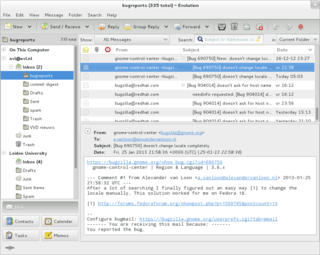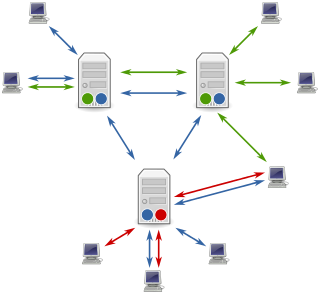
Electronic mail is a method of exchanging messages ("mail") between people using electronic devices. Email was thus conceived as the electronic (digital) version of, or counterpart to, mail, at a time when "mail" meant only physical mail. Email later became a ubiquitous communication medium, to the point that in current use, an e-mail address is often treated as a basic and necessary part of many processes in business, commerce, government, education, entertainment, and other spheres of daily life in most countries. Email is the medium, and each message sent therewith is called an email.

Spamming is the use of messaging systems to send multiple unsolicited messages (spam) to large numbers of recipients for the purpose of commercial advertising, for the purpose of non-commercial proselytizing, for any prohibited purpose, or simply sending the same message over and over to the same user. While the most widely recognized form of spam is email spam, the term is applied to similar abuses in other media: instant messaging spam, Usenet newsgroup spam, Web search engine spam, spam in blogs, wiki spam, online classified ads spam, mobile phone messaging spam, Internet forum spam, junk fax transmissions, social spam, spam mobile apps, television advertising and file sharing spam. It is named after Spam, a luncheon meat, by way of a Monty Python sketch about a restaurant that has Spam in almost every dish in which vikings annoyingly sing "Spam" repeatedly.
Yacc is a computer program for the Unix operating system developed by Stephen C. Johnson. It is a Look Ahead Left-to-Right Rightmost Derivation (LALR) parser generator, generating a LALR parser based on a formal grammar, written in a notation similar to Backus–Naur Form (BNF). Yacc is supplied as a standard utility on BSD and AT&T Unix. GNU-based Linux distributions include Bison, a forward-compatible Yacc replacement.
An electronic mailing list or email list is a special use of email that allows for widespread distribution of information to many Internet users. It is similar to a traditional mailing list – a list of names and addresses – as might be kept by an organization for sending publications to its members or customers, but typically refers to four things:
GNU Bison, commonly known as Bison, is a parser generator that is part of the GNU Project. Bison reads a specification in the BNF notation, warns about any parsing ambiguities, and generates a parser that reads sequences of tokens and decides whether the sequence conforms to the syntax specified by the grammar.
news.admin.net-abuse.email is a Usenet newsgroup devoted to discussion of the abuse of email systems, specifically through spam and similar attacks. According to a timeline compiled by Keith Lynch, news.admin.net-abuse.email was the first widely available electronic forum for discussing spam.
Lex is a computer program that generates lexical analyzers.
Eudora is an email client that was used on the classic Mac OS, Mac OS X, and Microsoft Windows operating systems. It also supported several palmtop computing platforms, including Newton and the Palm OS. In 2018, after being years out of print, the software was open-sourced by the Computer History Museum.

An Internet forum, or message board, is an online discussion site where people can hold conversations in the form of posted messages. They differ from chat rooms in that messages are often longer than one line of text, and are at least temporarily archived. Also, depending on the access level of a user or the forum set-up, a posted message might need to be approved by a moderator before it becomes publicly visible.
Various anti-spam techniques are used to prevent email spam.
Flex is a free and open-source software alternative to lex. It is a computer program that generates lexical analyzers . It is frequently used as the lex implementation together with Berkeley Yacc parser generator on BSD-derived operating systems, or together with GNU bison in *BSD ports and in Linux distributions. Unlike Bison, flex is not part of the GNU Project and is not released under the GNU General Public License, although a manual for Flex was produced and published by the Free Software Foundation.
Stephen John "Steve" Linford is a British entrepreneur and anti-spam campaigner best known for founding The Spamhaus Project.

Email spam, also referred to as junk email or simply spam, is unsolicited messages sent in bulk by email (spamming).
Berkeley Yacc (byacc) is a Unix parser generator designed to be compatible with Yacc. It was originally written by Robert Corbett and released in 1989. Due to its liberal license and because it was faster than the AT&T Yacc, it quickly became the most popular version of Yacc. It has the advantages of being written in ANSI C89 and being public domain software.

Conversation threading is a feature used by many email clients, bulletin boards, newsgroups, and Internet forums in which the software aids the user by visually grouping messages with their replies. These groups are called a conversation, topic thread, or simply a thread. A discussion forum, e-mail client or news client is said to have a "conversation view", "threaded topics" or a "threaded mode" if messages can be grouped in this manner.

Ray Everett, formerly known as Ray Everett-Church, is an American attorney, entrepreneur and author. He was dubbed "the dean of corporate Chief Privacy Officers" by Interactive Week Magazine, first creating that title and position in 1999 at Internet advertising company AllAdvantage. In 1997, he was profiled by The New York Times as an influential advocate of responsible online advertising. In 2013 and 2014 Business Insider designated him among the “Most Important LGBT People in Tech.”

Info-Mac is an online community, news aggregator and shareware file hosting service covering Apple Inc. products, including the iPhone, iPod and especially the Macintosh. Established in 1984 as an electronic mailing list, Info-Mac is notable as being the first online community for Apple's then-new Macintosh computer. Info-Mac was the dominant Internet resource for Mac OS software and community-based support throughout the 1980s and early 1990s.
MailChannels is a cybersecurity technology company based in Vancouver, British Columbia. It provides email security, and email delivery services for web hosting providers.

Usenet is a worldwide distributed discussion system available on computers. It was developed from the general-purpose Unix-to-Unix Copy (UUCP) dial-up network architecture. Tom Truscott and Jim Ellis conceived the idea in 1979, and it was established in 1980. Users read and post messages to one or more categories, known as newsgroups. Usenet resembles a bulletin board system (BBS) in many respects and is the precursor to Internet forums that became widely used. Discussions are threaded, as with web forums and BBSs, though posts are stored on the server sequentially.
RE/flex is a free and open source computer program written in C++ that generates fast lexical analyzers in C++. RE/flex offers full Unicode support, indentation anchors, word boundaries, lazy quantifiers, and performance tuning options. RE/flex accepts Flex lexer specifications and offers options to generate scanners for Bison parsers. RE/flex includes a fast C++ regular expression library.







